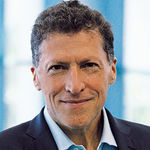
Arnie Weissmann
Ponce de Leon traveled from Spain to Florida in search of the mythical Fountain of Youth. And from that point forward, travel, health and longevity have been linked.
Silicon Valley billionaires are throwing money at anti-aging research, which begs the question for the rest of us: Is the goal to extend life, or extend quality of life?
Most people would agree that time spent traveling is thought to have high value -- why else spend thousands of dollars to leave your normal life behind?
In a recent video call, Chip Conley asked, "How do we reframe our relationship with aging?" Conley had become the in-house mentor to the founders of Airbnb after he had made his reputation as founder of Joie de Vivre hotels (now incorporated into JdV by Hyatt).
But Conley, 63, had a rough time in his late 40s and underwent a transformation of sorts, one with a happy ending. "My 50s was my favorite decade ever," he said.
Though he was the mentor at Airbnb, it's co-founder, Brian Chesky, helped him redefine himself. Chesky had dubbed him a "modern elder," and although Conley didn't like that label at first, Chesky defined it in a way he did like: A modern elder is someone as curious as they are wise. It's not about reverence. It's about relevance.
Conley, living in Baja California Sur, Mexico, wanted to share the insights he felt had turned his life around. Out on a run, he had an epiphany (he calls it his "Baja aha"): "Why aren't there middle-life wisdom schools? If people are living longer, what are we doing to help them from, say, 45 to 65, to reimagine and repurpose their adult life?"
That led him to found his current project, the Modern Elder Academy, a retreat that began in Baja and now has a second campus outside Santa Fe, N.M.
Six and a half years in, the academy has had 5,000 people from 48 countries attend its courses. Past guest faculty members have included "Eat, Pray, Love" author Elizabeth Gilbert, and essayist Pico Iyer is scheduled to lead a session in July.
Conley is not alone in the regenerative retreat space. Also on the video call was his current guest faculty member, musician/activist/hotelier Michael Franti, former frontman of the band Spearhead. Although the details were far different, he had been on a journey similar to Conley's, and drew similar conclusions.
His early songs, Franti said, were angry, but as his career developed, he, like Conley, found that he got happier as he got older. Although he still tours as a musician, he founded a retreat in Bali, Soulshine Spa and Wellness Resort.
"My whole life has been about trying to create music that lets people know that it's OK to be different, that it's OK to be the person who you are," Franti said. "And that doesn't stop just because you reach a certain age. In fact, even at age 58, things for me improve and get better. Our hotel in Bali is a place where people can feel a sense of wonder and excitement, whatever age they're at."
He extends his philosophy equally to his concerts and hotel. "When I step into who I am at the age I'm at, it gives people permission to be the age that they are," he said
Concern about aging is, apparently, not just for the old anymore. "I know it sounds weird for a 25-year-old to come to the Modern Elder Academy, but one-sixth of the people who come are millennials," Conley said. "Seventy-five percent are between the ages of 45 and 65."
Franti described his clientele as "early-30s through 80s." He offers weeklong retreats, which may be on music, writing or an aspect of wellness. There are Soulrocker retreats where he performs three nights a week. "Play is as important as processing," he said. "We're not a monastic place where you go and sit on a rock and meditate for eight hours."
Rather, it's a place for "people just saying 'I need a break' but want to go somewhere with intention. Inevitably, there's something that happens for them at our place because we built it to be that way."
Franti summed up why people would choose to attend one of his or Conley's retreats: They are, he said, for "people who go to travel not just because they want to take great pictures for Instagram but because they want to connect more deeply with each other. And they want to hit the reset button on life. That's really what our focus is."
The backlash against travel whose highest aspiration is a great Instagram post has been a long time coming, and I would be surprised if the formula Conley and Franti came up with, separately, doesn't gain traction. Without quality of life, what does longevity matter?